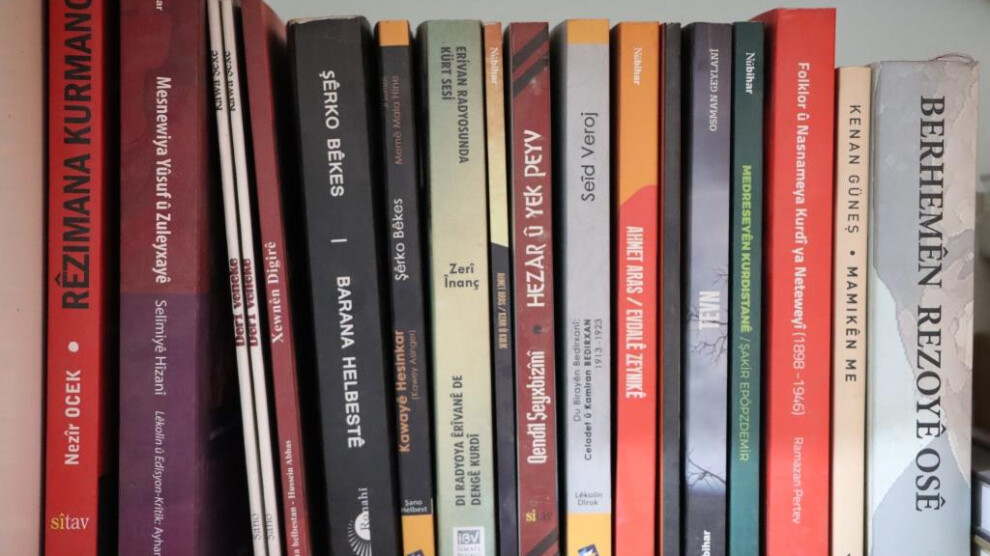The precious work of the North and East Syria Literature Council
Working on the compilation and evaluation of books, the North and East Syria Literature Council has rescued many books and writings that would have sunk into oblivion.
Working on the compilation and evaluation of books, the North and East Syria Literature Council has rescued many books and writings that would have sunk into oblivion.

The government of Damascus was putting pressure on writers and poets who, in their books, poems and writings, described the suffering, feelings and persecution of the people. Many writers and poets were exiled from Syria because they were writing about the reality of the people. The government of Damascus was banning books written in Arabic that featured anything related to Kurds.
After the Rojava Revolution, literature underwent changes like every other field. The Rojava Literary Committee, now called the Literary Council, acts as a roof for all writers.
The Literature Court was started by 3 women with the development of the revolution in 2016, then its work was extended and shared with teachers.
In 2017, a special committee was formed within the Literature Council for the reading and evaluation of books, and then the need for the opening of Şilêr publishing house was felt. The committee focuses on the evaluation and publication of books throughout Northern and Eastern Syria.

Different committees are formed according to the subject submitted by the author to the Divan. Along with these, there is also a translation committee, but it can only deal with the editing of the books translated before the revolution.
The council evaluates all kinds of books, from compilation of cultural books, to language books, from novels, to poetry, history, language, dictionaries, religion, theatre, health, short stories. The committee in many cases is rescuing works that face oblivion.
Speaking to ANHA, the spokesperson of the Council of Literature Nariman Evdikê said: "We have started this work in 2016, we are now in 2021, handwritten articles still come to us for publication as in the 1980s. We are aware that with this work, we will realize the dreams of these people. A few days ago, we received a notebook. Those who brought the notebook said that publishing this notebook was the biggest dream of their deceased grandfather when he was alive.”
The Rojava Revolution is known as the women's revolution, therefore the number of women writers has increased in the region, and the Divan of Literature gives importance to women's writing in its works.
Works by Arab writers living in Manbij, Deir ez-Zor and Raqqa regions are also sent to the Divan of Literature. Nariman Evdikê said that there are works coming in which are from 30 years ago and had been banned by the Damascus government.
One of the first achievements of the Literature Committee was the opening of the Amara Library, in the Jazira region, the largest library in the region. The Amara Library has thousands of books in Kurdish, Arabic, Persian, Turkish and English.
The Literature Committee has been organizing the Osman Sabri Literature Festival for many years. Literary products are sent to the festival from all over Northern and Eastern Syria, Kurdistan and the world.
The Literature Committee has relations with the Amed Kurdish Institute at Kurdistan level, the Kurdish Writers Association and the Kurdish Institute in Stockholm, as well as with Egypt in the Arab countries.
The books published are in accordance with the culture of the communities in the Northern and Eastern Syrian regions, the history of events and developments. The Literature Committee evaluates books only in terms of literature and knowledge.
Evdikê said: “There is no return of books in our regulations. Authors have to make the editing based on our comments, but we do not have the right to demand more changes from the author."
Evdikê added: “We do not interfere with different intellectual approaches because we want free literature to emerge at the end.” She added that 197 books in Kurdish and 148 in Arabic have been published so far.
Saying that Rojava authors abroad dream of delivering their books to the people of Rojava, Evdikê said: "Authors living abroad send us their books and we publish them here. Our aim is to bring the works produced abroad to Rojava."
Noting that they now have access to foreign publications, Evdikê said that they have created projects such as translating Rojava Revolution books.
Children’s books
Evdikê also underlined that they are planning the publication of children’s books in the future and added: "Our children have been reading in their own language for several years, but they do not have any materials or books to read and improve themselves other than school books. Children's books are not found in libraries.”
Drawing attention to the importance of literature for the young people of the region, Nerîman Evdikê said: “Many young writers have emerged in recent years. Writing in Kurdish is one of the achievements of the revolution. In other words, after the revolution, the Kurdish language was given importance and new writings have emerged. It is a good development to see young writers working on dictionaries, poems, research as well as novels.”